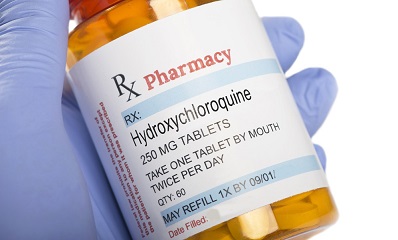New Peer Reviewed Study Published In Nature Journal Shows That Hydroxychloroquine Could Be Used As A COVID-19 Prophylactic
Thailand Medical News Team Aug 07, 2023 2 years, 6 months, 2 weeks, 4 days, 10 hours, 59 minutes ago
COVID-19 Drugs: The COVID-19 pandemic caused by the severe acute respiratory syndrome coronavirus-2 (SARS-CoV-2) has posed a significant global health challenge, with millions of people affected and a high mortality rate. In the quest for effective treatments and prophylactic agents, Hydroxychloroquine (HCQ), an antimalarial drug, emerged as a controversial candidate recommended for prophylactic use in various countries, including India. The potential of HCQ as an antiviral agent against SARS-CoV-2 was initially explored due to its in vitro effectiveness in inhibiting viral internalization and replication. Despite the promising in vitro results, clinical trials and reports on the efficacy of HCQ in COVID-19 have yielded conflicting findings.
 Background and Rationale for the Study
Background and Rationale for the Study
The use of HCQ as a prophylactic agent for COVID-19 was driven by the urgent need for effective treatment options during the early stages of the pandemic.
Initial in vitro studies suggested that HCQ could block proteolytic activation of the S-protein and inhibit viral assembly, thereby reducing viral internalization and replication. Consequently, numerous clinical trials were conducted globally to investigate the effectiveness of HCQ in controlling and treating COVID-19.
While some studies reported positive outcomes, demonstrating a reduction in viral infectivity, others found no significant impact of HCQ on COVID-19. This discrepancy led to skepticism regarding the efficacy of HCQ in COVID-19 treatment, and the World Health Organization (WHO) even declared its insufficiency in reducing mortality in admitted COVID-19 patients.
However, the potential broad-spectrum antiviral properties of HCQ and earlier reports supporting its efficacy should not be dismissed outright. With this in mind, the study team from the All India Institute of Medical Sciences, New Delhi conducted the following study.
Objective
In light of the conflicting reports on HCQ's efficacy, the study team aimed to investigate the effect of prophylactic HCQ on the ultrastructural level of various cells found in the bronchoalveolar lavage fluids (BALF) of severely infected and intubated COVID-19 patients. The study sought to compare the ultrastructures of ciliated epithelium, type II pneumocytes, alveolar macrophages, neutrophils, and enucleated granulocytes between patients receiving prophylactic HCQ and those not receiving HCQ.
Methodology
The
COVID-19 Drugs study team collected BALF samples from intubated COVID-19 patients to analyze the impact of HCQ on different cells at the ultrastructural level. The samples were analyzed using light and electron microscopy to evaluate SARS-CoV-2 viral infection levels and its effects on cell surfaces and organelles.
The study team compared the ultrastructural changes between patients receiving prophylactic HCQ and those not receiving the drug.
Results
The ultrastructural analysis revealed intriguing findings. Ciliated epithelium cells from patients receiving prophylactic HCQ showed significantly lo
wer infection levels and healthier nucleus/cytoplasm compared to the HCQ-negative group. This indicated that prophylactic HCQ may play a preventive role in SARS-CoV-2 internalization in ciliated epithelial cells. Moreover, fewer virions and double-membrane vesicles were observed in the HCQ+ group, suggesting a reduction in viral replication in these cells.
Type II pneumocytes, critical for immune defense and lung regeneration during injury, also displayed relatively healthier cytoplasm and fewer infections in the prophylactic HCQ+ group. Notably, HCQ levels in these cells were higher in the prophylactic group than in other lung cells. This further supported the potential impact of HCQ in controlling infection.
Alveolar macrophages and neutrophils showed little effect of HCQ on their ultrastructure in severe ARDS patients, indicating HCQ's limited impact on these cells. However, enucleated granulocyte fragments exhibited a higher tendency for phagocytosis of mature SARS-CoV-2 viruses in the HCQ+ group.
Conclusion
This study provides crucial insights into the ultrastructural effects of prophylactic HCQ on different cells in COVID-19 patients. The findings suggest that HCQ may have a protective role in preventing infection and preserving the cellular integrity of ciliated epithelium and type II pneumocytes. However, its impact on alveolar macrophages and neutrophils remains limited. The study highlights the importance of further research to fully understand the potential of HCQ as a COVID-19 prophylactic, considering its complex interactions with various cell types and the virus.
Overall, this study contributes to the ongoing scientific debate surrounding HCQ's efficacy against COVID-19, emphasizing the need for comprehensive investigations to develop effective therapeutic and prophylactic strategies for this devastating pandemic.
The study findings were published in the peer reviewed journal: Scientific Reports (A Nature Journal).
https://www.nature.com/articles/s41598-023-39941-6
MEDICAL DISCLAIMER: Please note that this article is based simply as research findings and not as medical advice. Hydroxychloroquine has not been approved by any regulatory agency around the world for COVID-19. Please do not attempt to take Hydroxychloroquine without consulting a licensed medical doctor first.
For the latest on
COVID-19 Drugs, keep on logging to Thailand Medical News.
